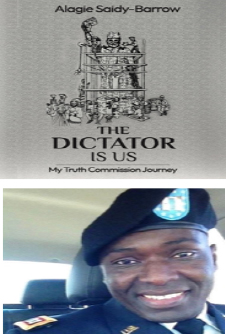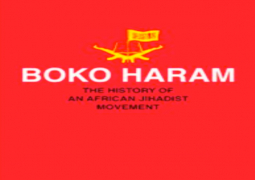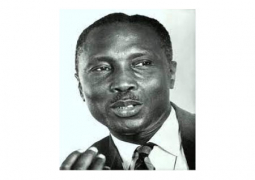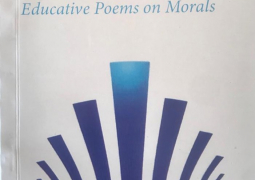
Pre-order by calling 2100016 or sending an email to globalhandspublishing@gmail.com and you will be assured of a copy before the launch.
From the former Director of Research and Investigations of the Gambia’s Truth, Reconciliation and Reparations Commission (TRRC) comes a behind-the-scenes narrative of investigating twenty-two years of human rights violations in the quest for accountability and reconciliation. Through interactions, interviews and testimonies of witnesses and State representatives, the author provides a narrative that walks the reader through the initial stage of building the research and investigations unit and investigating a wide range of incidents, such as the murder and torture of children during the April 10-11 student protests; the killing of West African migrants; the witch hunt of mainly elderly people; President Jammeh’s claim to “cure” incurable diseases such as AIDS; and the enforced disappearances. This book is illuminating for anyone interested in understanding how a dictatorship is birthed, nourished and sustained. It is an unforgiving social commentary in its assessment of the roles played by individuals and various institutions.
Author
Alagie Barrow was the Director of Research and Investigations for The Gambia’s Truth, Reconciliation and Reparations Commission. Alagie lived in The Gambia until he finished high school and moved to The United States. Alagie is a veteran of the US military, where he was an officer. He is an independent consultant specializing in Leadership, Investigations, Strategic Communications, and Security Management.
Excerpt
COLONEL EBRIMA CHONGAN’S TESTIMONY
In one of my meetings with Essa Faal, he indicated to me that he planned to conduct a thematic hearing on the twenty-two years of the Yahya Jammeh dictatorship. He intended to cover all the seminal events of human rights abuses over that period. The document he shared on these seminal events would become our thematic guide for investigations and I would write my team’s strategic investigative plan around it. Essa did a marvelous job drafting this document and sharing the names of victims as well as individuals adversely mentioned by witnesses. The thematic investigation guide made our job a lot easier, even if it was not always followed due to a lack of adequate planning or situations completely out of our control. There were many times when our investigations and hearings (on a particular issue or incident) were happening simultaneously.
The first theme in the thematic investigative document was the 1994 coup, and Colonel Ebrima Ismaila Chongan, one-time Deputy Inspector General of Police with institutional knowledge of national security at the time, was chosen to provide some clarity on institutional failures that gave rise to the coup as well as the sociopolitical conditions that precipitated the emergence of the Armed Forces Provisional Ruling Council (AFPRC). I had never met Colonel Chongan, but I had heard his name several times during his detention right after the 1994 coup. I also followed his writings on the Gambia L listserv after he went into exile in England and continued to speak out against the Jammeh dictatorship. He also wrote a book, The Price of Duty, about his life, the 1994 coup, and his subsequent detention in Mile Two Prisons.
To better understand some of the civilian government’s national security decisions before the military coup, we identified other key individuals who had been with the Ministry of Defense at various times before 1994. Prominent among these individuals were Abdou Sarah Janha, the longtime Secretary-General and Head of the Civil Service under President Jawara, and Sulayman Bun Jack, the Permanent Secretary of the Ministry of Defense. At the time of the 1994 coup, there was no Minister of Defense, and according to testimonies we received, the ministry was severely understaffed and overstretched.
We also reviewed the Armed Forces Act of 1990 to familiarize ourselves with the roles, functions, and operations of the Armed Forces of The Gambia. We sought to speak with several military officers from that time, one of whom was Baboucarr Jatta, who rose through the ranks to become Chief of Defense Staff under Yahya Jammeh. We also identified several senior military officers whose detention by the AFPRC seemed especially egregious and wanton. When we spoke to some of these victims, they chalked up their detention to personal grievances that Jammeh harbored against them from their time together in the military. Similarly, we contacted the head of police at the time, Pa Sallah Jagne, Maj. Antouman Saho, the head of the marine unit at the time, and others who in our estimation, were instrumental in the nation’s security setup in 1994. The only person who blatantly refused to cooperate with us was Lang Tombong Tamba (one of the commanders at State House at the time of the coup) who indicated that he had moved on with his life and was “letting bygones be bygones.” The number one priority on our list of witnesses was Colonel Chongan and arrangements were made to have him travel from England, where he resided, to The Gambia.
On October 15th, 2018, Colonel Chongan arrived in The Gambia and was prepared to stay until the 29th of the month to allow us to prepare for his testimony in person. We floated a few ideas around, including having him visit Mile Two and narrate parts of his story from the prison cells to serve as a backdrop for his testimony, but we ended up dropping the idea because we were unsure of how going back to the prisons could affect Chongan, as well as the logistics that would be involved. Chongan’s testimony would be the first and the simpler we kept things, the better. Unfortunately, due to logistical challenges, Chongan’s hearing date was postponed, and he had to fly back to England.
In November 2018, Baba had a meeting with some of the leadership of the TRRC and the Ministry of Justice. He informed me afterward that the first hearing was scheduled for January 7th, 2019, and that we should have our witness ready to testify on that day and have other witnesses lined up the days after. At the time, Essa was in Dakar and apparently was not in on the decision. I called him to say we needed to speed things up and start working on getting Chongan back in The Gambia. The fact that he was not consulted when the January 7th date was decided on did not sit too well with Essa and rightfully so. Neither the Ministry of Justice nor the TRRC commissioners had asked him or me if we would be ready by that date. I also called Chongan and asked him if he could be in The Gambia before the 5th of January 2019; thankfully, Chongan asked me to work on his ticket and he would again take leave from work to make the date.
Scheduling Colonel Chongan’s second trip to The Gambia so that it would culminate with the planned start date of hearings, January 7th, was difficult. Our facility was barely ready, and we had yet to conduct a dry run to ensure everything functioned smoothly. We contacted Chongan to coordinate travel dates, and Musu Bakoto Sawo worked on the details of the trip along with the TRRC finance unit. After some back-and-forth by email, we were able to arrange travel dates suitable for Chongan. I worked with my team to create a witness risk assessment sheet that we shared with Essa and Chongan and once everything was in place, I went to the airport with Essa to receive Chongan.
Word had gotten out that Chongan would be our first witness to testify, and some journalists also found out about his arrival date in The Gambia. I knew this because they called me to confirm. Though I declined to share the dates, I was under no illusions that Chongan’s arrival was no secret. I tasked two of our plainclothes officers to be present at the airport and to be on standby. We did not know what to expect especially given that Colonel Chongan was easily recognizable having held very high-profile positions in The Gambia. Talking to those who knew him well, including his family, I learned that his energetic demeanor also made him easily stand out in any crowd. As soon as he emerged from the crowd of arriving passengers, people recognized him and started greeting him, and I immediately saw what his family said about him. Thankfully, we were able to get him home without much delay.
Driving from the airport, we saw a police motorbike heading straight at us with blue and red lights flashing and sirens blaring. Some Gambian government official was running late to the airport and decided to have some hapless police officer sweep the road for him so he could get there on time. It was improper and dangerous. The police motorcycle was driving head-on at oncoming traffic, in effect demanding that drivers pull off the road. I refused to get off the road and after a nasty exchange of words with the police officer on the motorbike, he swerved around me as he fired a barrage of insults. Right behind the police officer was the SUV with a Gambia government license plate.
The hallmark of any dictatorship is that it encourages abuse not only at the dictator’s level but at every level of government. Because many government workers are fully aware of the abuse of authority by those above them and dare not do anything about it, abuse becomes normalized, leading others to also abuse their authority whenever they can get away with it. It is as if the dictatorship metastasizes within society, creating mini-dictators who adamantly guard their domain with uncommon fervor. Traffic, unfortunately for regular Gambians, is where such government officials often choose to display their dictatorial mindset by demanding that others get off the road and allow them clear passage. We had just encountered one such mini-dictator and I would come to meet more in The Gambia.
Once Colonel Chongan settled home, I left him with his security and called to inform my team and supervisors that the witness had made it safely and that everything was in order. Although we made no announcement on Colonel Chongan being the first witness before the TRRC, his arrival confirmed it for the public and I continued to get calls from journalists and other curious individuals craving for confirmation. One such individual told me that our “secret” was out, and he said someone saw me at the airport when I went to pick up Chongan. For some reason, many of us take pride in sharing a secret just to show that we are in the know.
Essa and I worked with Chongan to finalize his statement and on January 7, 2018, I sat in the witness room with Colonel Chongan as he looked over his testimony one last time. I asked his wife where she wanted to sit when Chongan testified, and she chose the front row, the closest she could be to her husband. From what Colonel Chongan told me, the two of them had traveled a difficult road together before they ended up in exile in the United Kingdom. One area the TRRC did not adequately cover was the pain and suffering of the spouses of our victims. Women’s victimhood was only considered when their husbands were deceased. Their pain and suffering when their husbands were imprisoned or detained hardly factored in our narratives.
I thought Colonel Chongan’s testimony would be a moment of redemption and triumph for him and his family. Chongan had been betrayed, demonized, beaten, humiliated, imprisoned, and exiled from the land he loved. He had stood up for his country when many chose not to. He sacrificed when others opted to align with the tyrant. Now the tyrant responsible for Chongan’s absence from home for two decades was the one in forced exile. Colonel Chongan had the last laugh.
Everything was set for the former Deputy Inspector General of Police to go on the record to share with the country what he knew, witnessed, and experienced before, during, and after the July 22, 1994, military coup. There was a knock on the witness room, and we were informed the commission was ready to hear the colonel’s testimony. I got up, rendered a salute, and told him, “Go well, sir.”





